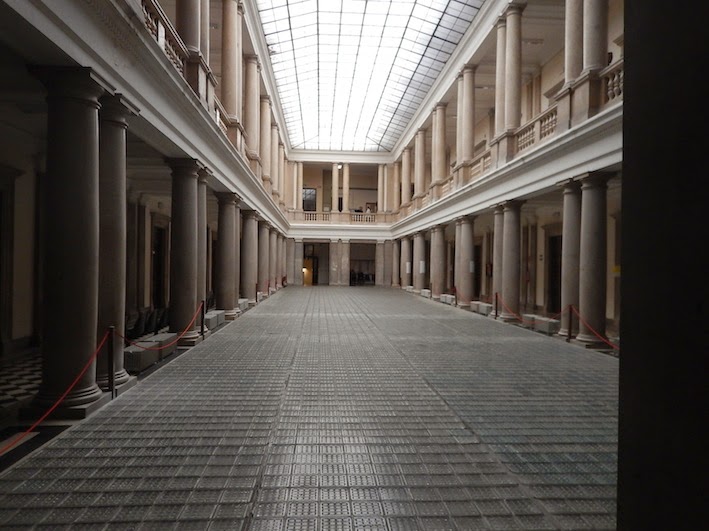
Before Court, once again. Today takes place the final hearing in the trial against one of Tree Trieste’s members, charged with disobeying to public authorities.
What happened then? The Guardia di Finanza (Italian tax police) went to the man’s store for an inspection. As always, they were part aggressive, part inquisitive. They waited for a customer to leave, stopped him, and brought him back in the store to verify he had the correct receipt.
The store owner did not oppose the inspection, but declared himself a citizen of the Free Territory of Trieste, and accused the finanzieri to breach the very the Italian laws. Namely, the 1947 Italian Peace Treaty, which makes Trieste independent and exempts the city from Italian taxes.
The police reacted concluding the inspection (without finding infringements) and then asking the store owner for a document: his ID would have confirmed he was Italian, not a citizen of the Free Territory.
Given the aggressive, arrogant behavior of the two officers, the store owner refused to show his ID document: they already had his data after all, it was part of the tax inspection.
That’s it. Refusing to show an unnecessary ID, because it was not needed for the police’s job, but served to humiliate a citizen and downgrade him, the man was committed for trial.
Unfortunately, it isn’t unusual for tax inspections to be like this: it is not surprising that citizens feel downgraded to servants, and that the inspections are filled with tensions and discontent.
Having the Guardia di Finanza show up in your store at the busiest area, in the busiest day, is rather unpleasant. One must stop working, answer the police as the customers leave, annoyed and afraid of the tax police.
And they can’t be blamed. Indeed, in Italy even a simple tax inspection can become an endless nightmare. But Trieste is not Italy. In Trieste, one must bear with the unwelcome presence of the guarantors of “constituted disorder”. Namely, the simulators of Italian sovereignty over Trieste.
In breach of the 1947 Treaty of Peace and of the 1954 civil administration mandate, the local representatives of the Italian Government, shielded in Italian nationalism, enjoy great immunities.
Instead of granting the Free Territory its own State Budgets, as did the British-US administration (1947 – 1954), the local administering authorities, to better simulate Italian sovereignty, force Trieste and its Free Port to pay Italian taxes and public debt. This violates the 1947 Treaty of Peace with Italy (art. 5 of Annex X).
In Trieste, taxations is used as a weapon against the people who claim their legitimate rights deriving from the Free Territory’s status. The Agenzia delle Entrate (Tax Revenue Agency) and the Guardia di Finanza target all people who deny Italy’s tax-raising authority over Trieste.
A campaign that leads to heavy fees, which damage the local economy. Again, this is all against Italy’s own laws.
Here, this is how we get to the trial, obviously a political one. We see it since the beginning. As usual, the hearing room (the smallest of the Courthouse) is guarded by the Carabinieri. All the lawsuits against Free Trieste’s supporters, since July 2013, when, during a public hearing, for the first time, a judge was questioned.
Once again, the Carabinieri stand in defense of the law, but the law is not here. Three men and a woman almost block the small courtroom’s entrance. It is hard entering (the space for the public is, maybe, five square meters…).
There is also the DIGOS (Italian political police), but they are more discrete, hidden among the public and outside the courtroom. One could almost think they keep an eye on the Carabinieri and not on the dangerous “seditious” citizens (their crime is claiming their legitimate rights. Which are only three: me, another person, the accused party, and the Movement’s lawyer.
The judge is on time, at exactly 10AM he opens the hearing. By the way, he is the same judge from July 2013. This means he would be incompatible with a supporter of the Free Trieste Movement, even more so because he has filed a complaint against it due to those events.
He has already been rejected on the grounds of incompatibility, but in vain: what are even impartiality and integrity? People who try to exercise their right to not be subject to the authority of an obviously hostile judge are immediately punished with a fee.
You reject the judge, you must pay for daring to be aware of your rights and, therefore, a dangerous overthrower of the established disorder, which consists, you guess it, in never-ending nationalism and mafia-like nationalistic circles. The same which, since decades, suffocate Trieste.
The hearing continues like any other political trial. The law is not a matter of concern in the debate. The Prosecution Office seeks the highes possible punishment for the “terrible” crime: a EUR 200 fee.
Our lawyer emphasizes the accused person’s lack of maliciousness: he was exercising a right after all. Also, since April 1st there is a new law: it decriminalizes petty offenses, as is the one allegedly committed by the accused person.
The judge should declare that the crime cannot be prosecuted. Not only his decision cannot go against the law, but he must respect the accused person’s right to enjoy the most favorable conditions.
Instead, the judge suspends the hearing. 15 minutes later he returns with a judgement: he condemns the citizens and rules the highest possible punishment, the EU 200 fee: (in)justice is made.
I listen to the judgment, arms crossed, like the Carabinieri standing in front of me. A face to face between the citizens of the Free Territory of Trieste, who call for legality with the law as their only weapon and the armed representatives of local Italian authorities who think might – their guns holstered – makes right. The international legal order notwithstanding.
Translated from blog “Ambiente e Legalità” – “Environment and Legality” by Roberto Giurastante
